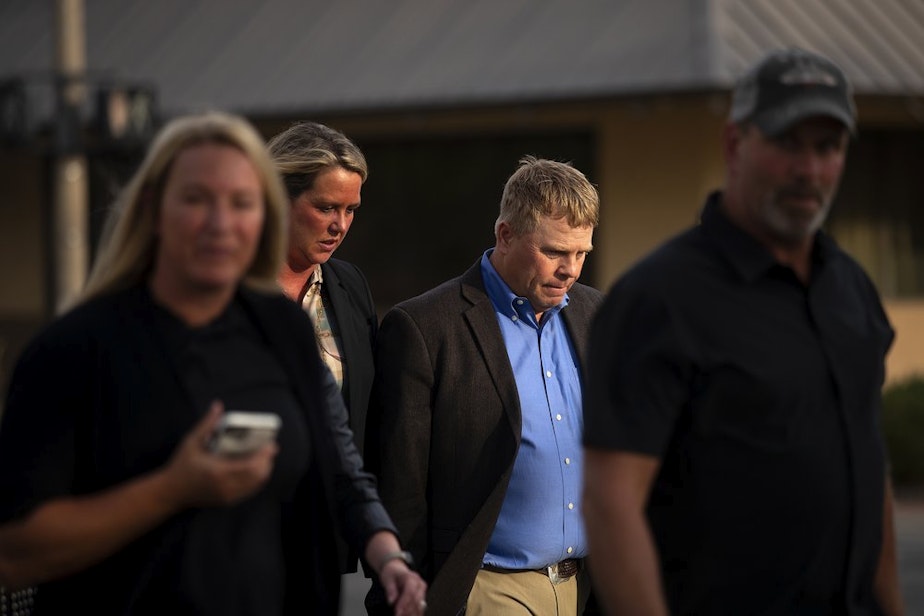Arguments surrounding Inslee's State-of-the-State: Today So Far

Shortly after Washington Gov. Jay Inslee delivered his 2023 State-of-the-State address, state Republicans began commenting. It's not all battle lines that are being drawn as lawmakers look to the current legislative session, but that doesn't mean there isn't a gap between Washington's red and blue.
This post originally appeared in KUOW's Today So Far newsletter for January 12, 2023.
There's a pretty simple formula when reporting most political news stories. Set up opposing sides, document their jabs at each other, cover the triumphs, and in the end you'll either have a tale of victory or a tragedy.
It's actually the same formula for a lot of sports writing, talk radio, or Marvel films. The downside to this sort of coverage is that it relies on conflict and battle. It's easy to fall into reporting the battle because, honestly, conflict actually is what's happening between Republicans and Democrats most of the time. Sadly, battle-laden headlines are certain to get attention, just as lines will form for "Guardians of the Galaxy Vo. 3" in May.
Consider Gov. Jay Inslee's 2023 State-of-the-State address this week. The issues he leaned into, such as housing and homelessness, are the same issues Republicans are highlighting and are expected to be hot topics in the Legislature this session. Of course, there are battle lines drawn over how to exactly fix such problems. It's important to note these lines, but it's just as important to go beyond them and find where work may actually progress, and where we can expect the same old friction.
Inslee's address didn't offer anything new. It was mostly a hype event for his budget and the work state Democrats have done in recent years. It was similar to past State-of-the-State addresses: this is what is going well, and these are our challenges, that's why you should support my agenda, and Washington is so wicked awesome (my version, not his exact words).
Republicans wouldn't refer to such problems as "challenges," however. The GOP response was delivered by Republican Rep. Peter Abbarno of Centralia, who came out swinging with the argument that such challenges are actually failures that have grown under Inslee's leadership, as well as under Democratic control of the Capitol. Like the governor's presentation, the rhetoric here wasn't anything new. The GOP response was essentially a list of the same challenges, along with: Washington's problems have only gotten worse, also freedom, American dream, your children, and Washington is so wicked awesome (again, my version, for the sake of brevity).
Sponsored
The GOP argument is logical, to a point. Washington has had some very negative outcomes, from homelessness to housing, and the environment, despite the rhetoric many promote. And Democrats do maintain a majority at the state level. We want to be good on climate change issues, but our carbon output is up. In 2005, King County said it was going to end homelessness within 10 years and, well, that didn't happen. And despite how often Seattleites say they will hang out with you, they don't call, and they don't text. Did they even mean what they said when they told you they wanted to hang out soon?!
Gov. Inslee also has a logical argument. When Washington Republicans say crime is up, for example, they often point to police accountability laws passed in Washington, recently. But those laws cannot account for the crime across the United States where Washington's laws don't extend. You'll find a mix of blue and red states with similar crime issues. When it comes to climate change, much of the Democrats' big carbon plans have only come online recently. The cap and invest program doesn't even start until next month.
It might be helpful to note that our problems have continued amid something else that has persisted over the years — the rhetoric of pointing fingers, tribalism, and calling out people who aren't on your team. This level of rhetoric doesn't rise above the maturity of two kids who have been ordered to stay on their side of the car during a long road trip, but insist upon screaming over who crossed the line first. Unlike that car trip, however, I don't think we have enough Benadryl to chill folks out at the Capitol. We're more likely to hear party jabs, instead of, "Hey, we don't agree, but let's find a way to make things work because we are elected officials after all and should at least try to do our jobs."
Perhaps this is why more and more of Gen X, Millennials, and Gen Z are turning away from party affiliation and checking the box for "independent."
There will remain a divide between Republicans and Gov. Inslee in the session ahead on some issues. At a GOP press conference Tuesday, state Republican leaders (Rep. J.T. Wilcox, Rep. Jacquelin Maycumber, Sen. John Braun, Sen. Judy Warnick, and Rep. Abbarno) showed as much. Republicans continue to disagree with Democrats' approaches on public safety. Rep. Wilcox said it was the one part of Inslee's address that he reacted very negatively to. Sen. Braun commented that Washington law protecting abortion rights has been in place for decades and does not see any need to establish a state constitutional amendment for this issue, as Inslee has promoted. Braun further said he would talk about approaches to gun safety if Democrats "are serious," but then also said that the real issue is larger and wants to talk about mental health and substance abuse. Inslee and Attorney General Bob Ferguson are pushing a series of measures, including a ban on assault weapons.
Sponsored
RELATED: Where is Seattle's "right size" housing "in the right place, and at the right price"
If you're looking for one issue that lawmakers could make progress on this session, housing is it. Sure, Sen. Braun said that the math around Inslee's $4 billion proposal "doesn't work;" and Abbarno pointed out that building tens of thousands of housing units is one thing, but building enough infrastructure to support it all is another. That brings up a few valid curiosities. How will tens of thousands of new units affect the energy grid? If the region already has a problem dumping sewage in local waters, how will we handle even more sewage hook ups?
Rep. J.T. Wilcox, seemed more open to dialogue over Inslee's proposal, however, and pointed to a range of bills with both GOP and Democrat support. He also sounded positive around many housing ideas, such as middle housing and making permitting easier. A middle housing effort didn't get far last year, but both parties appear supportive of moving forward this session.
"It's not the worst suggestion that's come," Wilcox said about Inslee's $4 billion proposal. "Will we support it? I want to listen to testimony and go through the process."
"The ideological conflict has blown housing bills over the last few years, and I've asked that we talk about solutions we can agree on first, and worry about demonizing people that provide housing last. And actually, I've got some hope that is going to happen. So I look at House and Senate bills, and take a look at how many Republicans and Democrats, who are very serious people, who are sponsoring these together."
Sponsored
That's the sort of talk that certainly won't sell any Marvel tickets, but might get things passed in Olympia.
AS SEEN ON KUOW

If you’ve eaten beef here in Washington, odds are you’ve bitten into one of the cows that helped make the Easterday family of Pasco, Wash. very, very rich. Cody Easterday had plans to protect that wealth by securing 265,000 cows for Tyson Fresh Meats and Segale Properties. But there was one issue: those cows only existed on paper. "Ghost Herd" is the latest podcast out of Northwest Public Radio and KUOW, telling a story of deception and greed from our own backyard. (Megan Farmer / KUOW)
DID YOU KNOW?
Sponsored
There's a new Covid variant setting off alarms for health experts because, yet again, this new variant is far more transmissible than before. Since every new variant of concern has been "more transmissible," this one has to be quite a spreader. The name chosen for it ... is "Kraken." It's the most common strain in the Northeast right now. Expect it to start showing up more and more in the Northwest.
"Thanks to the protection from vaccination or from prior immunity, especially if you've had Covid recently, chances are you might get this variant because its so transmissible, but it's likely that the infection will be mild," Dr. Pavitra Roychoudhury at UW Virology told Seattle Now.
Dr. Roychoudhury said that Covid has become a "complex family tree" after a few years of mutating into various variants. Kraken's real name is XBB.1.5, which sounds more like a Star Wars droid than a serious illness. To help with communication, doctors come up with short names to save time, which is where we get "Kraken" from. Perhaps they're trying to communicate how serious Covid can be, too (just a guess). Omicron sounded like a Bond villain or an evil Transformer, which really made an impression. Kraken certainly makes an impression too, as in, this is a big one to watch for.
Hear Dr. Roychoudhury's full conversation about Kraken and the current state of the Covid pandemic here.
ALSO ON OUR MINDS
Sponsored

New nation, new ideas: A study finds immigrants out-innovate native-born Americans
Many studies over the years have suggested that immigrants are vital to our nation's technological and economic progress. Today, around a quarter of all workers in science, technology, engineering, and math (STEM) fields are immigrants. A new economic working paper by a group of economists finds that, between 1990 and 2016, 16 percent of all US inventors were immigrants. More than that, they find that the "average immigrant is substantially more productive than the average US-born inventor." Immigrant inventors produced almost a quarter of all patents during this period.

